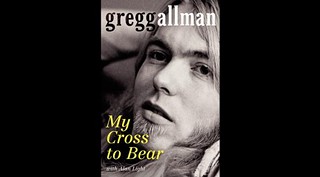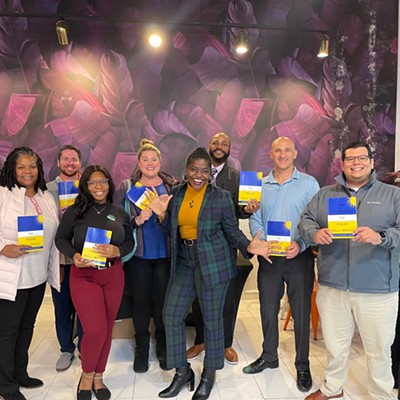“Please don’t ask me to be Mister Clean,” Gregg Allman sang on the classic Brothers & Sisters album, “cuz baby I don’t know how.”
Allman wrote that song, “Wasted Words,” in 1972, and it proved prophetic: His autobiography is not only a chronicle of a life filled with dirty dealings, drugs and disappointments, it wastes no words. My Cross to Bear, named for one of the standout tracks on the Allman Brothers Band’s eponymous debut, is a brutally honest rock–star memoir.
It’s all here — the copious amounts of substances, the wretched excesses, the booze, the groupies. The overdoses, the arrests, the near–death experiences and the inevitable liver transplant. Madness in Macon, fear and loathing in New York.
Always, however, there’s the music. In a voice that betrays both astonishment at his successes, and an innate understanding of how lucky he is to still be alive to tell the tale, Allman describes how he and his (slightly) older brother Duane fell hard for blues music, and rock ‘n’ roll, while growing up hardscrabble in Daytona Beach, Fla. in the 1950s and ‘60s.
Duane quickly mastered the guitar, Gregg the Hammond B3 organ. Gregg could sing like a banshee, while his brother couldn’t carry a tune. They were perfectly matched.
There’s no need to re–hash the glories of the Allman Brothers Band; with second guitarist Dickey Betts, Duane Allman created a sound that imbues and underscores great rock ‘n’ roll even today.
Duane’s 1971 death in a motorcycle accident is just one of the many tragedies Allman recounts in painfully personal detail.
In My Cross to Bear, we also learn, among other things, that Gregg Allman thought the Grateful Dead were crap; that he still talks to his ex–wife, Cher; that he and the remaining members of the ABB didn’t fire Betts in 2000 — according to Allman, they were offering him time to get himself clean, and then come back to the group. Betts thought otherwise.
They haven’t spoken in 13 years.
Much like Life, Keith Richards’ autobiography, My Cross to Bear is fascinating, funny and freewheeling.
A longtime resident of Richmond Hill, Allman will sign copies of his book for two hours Saturday, Feb. 16 at Telfair Square.
You strike me as the type of person who doesn’t do a lot of looking back. Is it kind of weird to open your heart like that and go back? And so why did you write the book?
Gregg Allman: It’s not something I do frequently, no. It wasn’t meant to be a book, really. It was a journal I started keeping in about 1982. I figured, I had such a great life, and had such fun every day, so many adventures and stuff. And why not write it down? I’ll end up an old codger on the porch some day. I can, you know, pick up a few sheets and kind of re–live it.
What turned the tide?
Gregg Allman: My manager! Michael said “What you got there?” I said, it’s a duffel bag full of cassette tapes. “Really? What’s on ‘em?” Well, it’s my life. [big laugh]. He says “What? Let me have a closer look at that.” So he talked me into writin’ this book, see if they wanted to publish it. And they did. It went on up there; it got up high on the best–sellers list.
Did that surprise you? You’re a humble guy — did you ask yourself “Why would anyone give a shit?”
Gregg Allman: Yeah, really [laughing]. You always ask yourself that. “What I’m doing — does it hold water or not?” Just like when you’re writin’ a song — “Is this a piece of crap? Or does it have potential?” You have to stop every now and then and ask yourself that.
Did you talk the whole book into a tape recorder?
Gregg Allman: I wrote out about four chapters, and I thought “Man, this is not gettin’ it. With all the electronics around here, we don’t have to do this.” So there was this one guy that works with the Brothers — I caught him stealin’ and I had to fire him later, but that’s another story — he had this strange knack of knowing, like if you asked him “Where did the Allman Brothers play in February of 1991?” pow, he’d come out with the answer.
And I thought hmmm ... seeing as how the chronological order seems to be the most critical part of writing an autobiography, gettin’ it all in the right order, I had him help me. Each day, he came over. I said look, I want you to come over every Thursday, set up your recorder, and you start askin’ me about this time and that time. You keep track of it and just go up the years, you know? So we did, and that’s what we got.
There obviously would have been things you didn’t remember. How much prodding from your guys did it take?
Gregg Allman: He would bring something to mind, and I would say “Oh yeah, I remember that.” And that would attach to something else, which would attach to something else ... pretty soon, you got a book.
With several similar books, I skipped over the early, boyhood years to get to the cool stuff. But I read yours cover–to–cover. Is your mom still around?
Gregg Allman: Yeah, 95 years old and she’s fit as a fiddle.
Did she help you with stories from the early days?
Gregg Allman: I had to verify stuff with not only her, but with a lot of other people. Because I wanted to be sure of it. You don’t want to put anything in there that’s bullshit, or something where you get the time totally wrong — like “No, it wasn’t that way at all.” So no, there’s none of that in there.
That took the longest of anything, to check out everything.
How much work did Alan Light, who’s billed as your collaborator, do? What was his role?
Gregg Allman: After it was all written, he made sure that it sounded like me talkin.’ So what he did was, he took the four chapters that I’d written out totally, and from that he got how I worded things and what have you. And then he just went and got the rest of it to sound like it was me talkin.’
You didn’t hold much back. Was there ever a thought in you that “there are some things I don’t want to put in here”?
Gregg Allman: Oh, yeah, man! [laughing] There’s ten tons of shit I didn’t put in there!
Lennon used to talk about the stuff that went on during tours, the things nobody ever mentioned in polite company.
Gregg Allman: It’s a kick! It’s wonderful. I love it. I just got off tour, probably the best one I’ve ever done.
You do a lot of interviews. Do you ever think “I can’t talk about Duane any more. There’s nothing I haven’t said a million times.”
Gregg Allman: Yeah, I do feel like that now and then. I guess everybody does.
What about the broken business relationships you write about, with (Capricorn Records founder) Phil Walden and Dickey Betts? Were those hard to talk about?
Gregg Allman: Not Walden. Walden screwed me royally, for lots of money. I got most of my publishing back, but from the get–go he took it, you know? He took all my publishing, that old trick. One day I told him my mother, Geraldine — that’s G. Allman — started writin’ the songs. And I forgot how.
But in the end, you wrote a nice eulogy for Walden when he died.
Gregg Allman: Well, that’s common courtesy. I mean, the man’s dead for God’s sakes.
Savannah Book Festival
Gregg Allman signing
Where: Telfair Square
When: Noon–2 p.m. Saturday, Feb. 16"Please



























